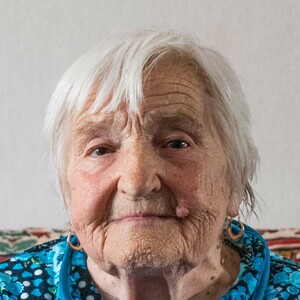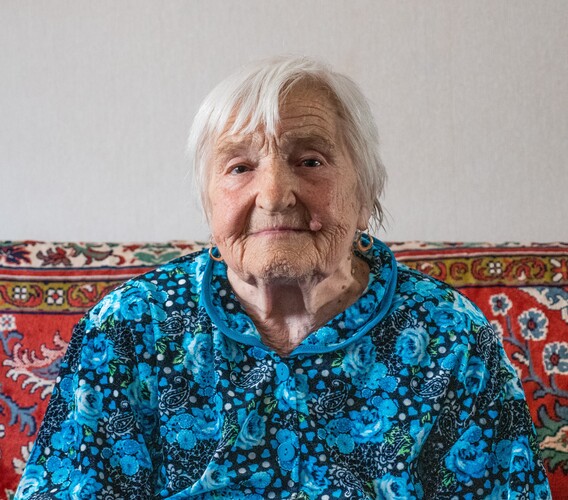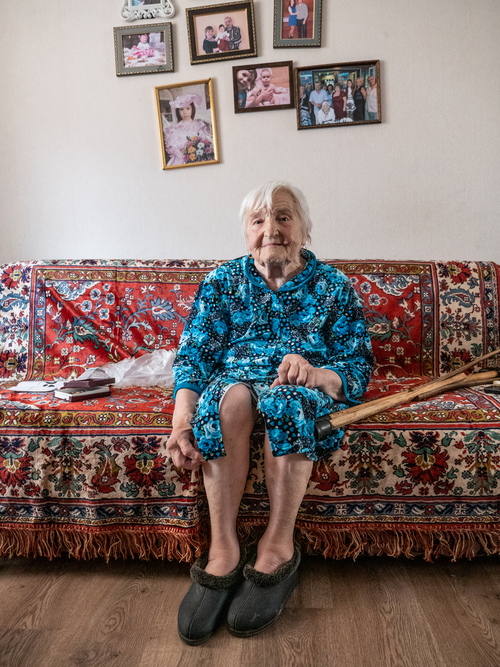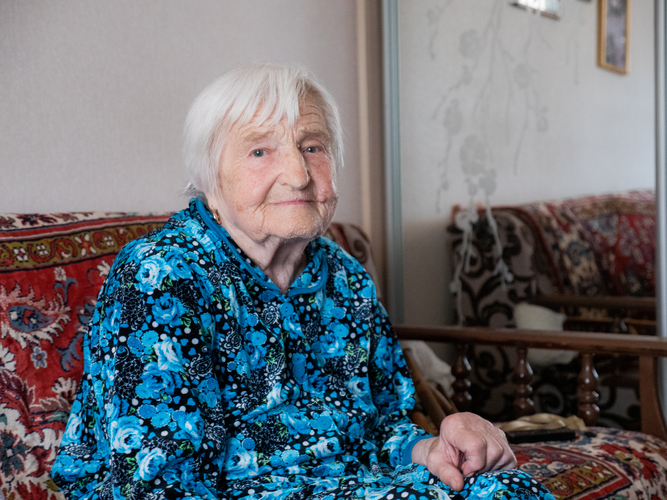Antonina Sydoruk was born on November 24, 1927, in Slobidka-Smotrytska in the Smotrytskyi (now Kamianets-Podilskyi) District of Khmelnytskyi Oblast. She had two siblings, Ivan and Mykola. Her parents were successful farmers and had a large household. Therefore, they were persecuted under the process of dekulakization (the political repressions against prosperous peasants in the USSR, 1917-1933). Her father went into hiding to escape persecution. He ended up in Mariupol, where he worked as a handyman. In 1930, Antonina’s father decided it was safe to return to his family. He began working on a collective farm (“kolkhoz”). Antonina recalls that the family was destitute: “It was just horrible slavery. They paid us nothing on the collective farm. You might work for a year and receive hard-earned money - but taxes were high”.
As a child, Antonina survived the Holodomor of 1932-1933. She describes the desperate measures she took to survive: “We, as children, climbed cherry trees. Cherries and plums make such a sticky substance on trees. We wrapped it with leaves and ate it.”
The German-Soviet war began when Antonina was herding cattle. The children were unaware that the pastures were full of mines: “There were nine children: eight boys and one girl - torn to pieces. When their mothers came to pick them up, they screamed and howled. That was when people said: ‘The war had begun”.
When the Germans began to recruit forced labours for work in Germany, they promised the workers, according to Antonina, “cultural work and a good salary.” Instead, people found themselves behind barbed wire. They sent letters home to their relatives, detailing the difficult conditions. When it came time for the Germans to recruit a second set of workers, nobody believed the lies and the villagers were taken away by force - that was when Antonina’s older brother was deported to Germany. In the spring of 1942, when Antonina was fourteen years old, she was also taken to Germany for forced labour: “My father came and wanted to replace me, but one man told him: ‘don’t do that, because they won’t let her go, and they won’t let you go either.’ He said maybe such small kids would be returned. But this did not happen - we were not sent back”.
Antonina was sent to a labour camp in Osnabrück, Lower Saxony, where she was forced to work at the copper-wire factory OKD and the ammunition factory Teuto-Metallwerke. She was then sent to the Gartlage collective camp. There were also Italian, Dutch, and French prisoners of war in the camp, in addition to the forced labourers from the Soviet Union. Antonina still remembers her prisoner number: 401. She had to wear the number, as well as the “OST” patch on her clothing at all times: “It was impossible to go out, even from the barrack, without it. Police officers beat you if you did not have it. No one called us by name but by number. Just like cattle”. Antonina worked at the factory for 12 hours every day, a week on the night shift and a week on the day shift.
The forced labourers were malnourished; Antonina describes the provisions they received: “We didn’t have much to eat - just rutabaga, spinach, and a piece of bread. They gave us food stamps, with which we were charged for our food. If you did something wrong - they take that food stamp away”. Working conditions were so difficult that girls from Antonina’s native village died one by one.
The camp where Antonina was being held was bombed repeatedly, and the inmates were forced to build new barracks after their shifts at the factory. By war’s end, Osnabrück was almost completely destroyed. Losses were high, among both residents and forced labourers. Antonina and other forced labourers were transferred to another camp in Oldenburg, where they were hardly fed. There, she was liberated by the Allied troops. Her return home was delayed, as the Soviet state did not trust its citizens that had been imprisoned abroad during the war. Antonina was subject to an inspection from the Soviet authorities. She passed and was allowed to return to her village.
After the war, Antonina finished school and entered a pedagogical institute. Her studies took place during the post-war famine of 1946-47: “There was a terrible famine. We students had nothing to sleep on, nothing to eat. We took rotten potatoes and dried them. Their flour is white, but when you dilute it with water, it turns green and smells so bad”.
Following her studies, Antonina worked teaching Ukrainian language and literature. She never spoke publicly about her experiences as a forced labourer in Germany. Since 2015, she and her daughter have visited Osnabrück twice at the invitation of the memorial sites Augustaschacht and Gestapokeller. There she laid flowers on the graves of forced labourers from her village. At the beginning of the full-scale Russian-Ukrainian war, her granddaughter and great-grandchildren were forced to evacuate to Osnabrück. Antonina died in 2023 in Khmelnytskyi, Ukraine.
Written by Jane (Taipei), Sandra (Göttingen), Wojtek (Warsaw)



